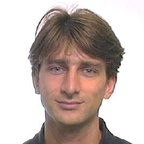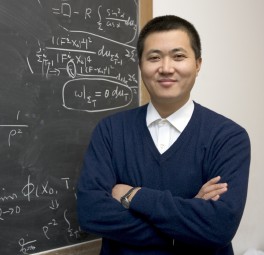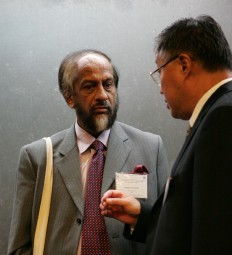Personal tools
News from ICTP 110 - Dateline

2005 Calendar
of Events
The ICTP calendar of events for 2005, published in print form
in October, lists 42 activities-colleges, colloquia, conferences,
schools and workshops---on subjects ranging from nanoscience to
superstrings, regional weather prediction to quantitative ecology,
and soil physics to computational cosmology. Six of the nine activities
outside of Trieste will be held in Africa (Egypt, Ghana, Namibia,
Niger, and Tanzania); the other three in Cuba, Indonesia, and
the Islamic Republic of Iran. To review ICTP's 2005 calendar of
activities, see www.ictp.it.
The calendar will be continually updated on the web.
Visit to India
ICTP director K.R. Sreenivasan visited India between 3-14 July, where he met with the heads and scientific staff of the International Centre for Genetic Engineering and Biotechnology (ICGEB) Indian Component in New Delhi; delivered the Second C.K. Majumdar Memorial Lecture at the S.N. Bose National Centre for Basic Sciences in Kolkata; and spoke at the 22nd International Conference on Statistical Physics (STATPHYS 22) in Bangalore. Throughout the visit, the director discussed potential areas of cooperation between ICTP and India's scientific institutions.
Dirac Medal
James D. Bjorken, professor emeritus of physics, Stanford University, and Curtis G. Callan, professor of physics, Princeton University, USA, are the winners of the 2004 Dirac Medal. The announcement was made on 8 August, the birth date of the prize's namesake, Nobel Laureate Paul A.M. Dirac, who was a close friend and strong advocate of the Centre. Bjorken and Callan are being honoured for theoretical investigations that led to the use of deep inelastic scattering for shedding light on the nature of strong interactions. The awards ceremony will take place at a later date. For additional information and the list of previous winners, see www.ictp.it.
Prizes
Gabriele Veneziano, senior staff member of the European Organization for Nuclear Research (CERN), who has lectured at ICTP's high energy workshops since the 1980s, has received the Dannie Heinemann Prize for Mathematical Physics for his "pioneering discoveries in dual resonance models," which have helped lay the foundation for string theory and the quantum theory of gravity. Juan Maldacena, professor of physics at the Institute for Advanced Study in Princeton, New Jersey, USA, and course director of several ICTP high energy physics schools, has been given the Edward A. Bouchet Award "for providing a deeper understanding of the correspondence between theory in d space-time dimensions, and for communicating fundamental principles of theoretical physics to the public, including Spanish-speaking audiences." For additional information, see www.aps.org/praw/index.cfm.

Uros Seljak, a native of Nova Gorica, Slovenia, has joined the ICTP High Energy, Cosmology and Astroparticle Physics group. Seljak received a Ph.D. in physics from the Massachusetts Institute of Technology (MIT), USA, in 1995. He has held posts at the University of Ljubljana and Jozef Stefan Institute, Slovenia; European Organization for Nuclear Research (CERN), Switzerland; Max Planck Institute for Astrophysics, Germany; and Harvard-Smithsonian Center for Astrophysics, USA. Most recently, he was assistant professor of physics at Princeton University, USA.

Li Jiayu, previously with the Chinese Academy of Sciences'
Institute of Mathematics, has joined the ICTP Mathematics group.
Li, whose area of expertise is geometry, received a Ph.D. from
Hangzhou University in 1988. In addition to working with the Chinese
Academy of Sciences, Li has also been employed with Anhui University
in Hefei; Fudan University in Shanghai; and the Academy of Mathematics
and System Sciences in Leipzig, Germany. He was a Humboldt Fellow
in 1996-1997 and was selected an Outstanding Young Scientist in
China in 1999. From 1992 to 1994, he was a post-doctoral student
with ICTP's Mathematics group.

George Thompson, member of the ICTP High Energy, Cosmology
and Astroparticle Physics group for the past 11 years, has been
appointed head of the Office of External Activities (OEA). Australian-born
Thompson obtained his Ph.D. in physics from the University of
Tasmania in 1982. He has been a Diploma Course teacher since 1993.
Climate Change Here

Rajendra Pachauri and Dahe Qin
The lead authors of the Intergovernmental Panel on Climate
Change (IPCC) Working Group 1, which focuses on the physical sciences,
met at ICTP from 26-29 September to kick-off IPCC's fourth assessment
report. Rajendra K. Pachauri, IPCC chairman, was among those at
the opening session. Susan Solomon (USA) and Dahe Qin (China),
co-chairs of Working Group 1, were also in attendance. The first
three rounds of assessment reports (1990, 1995, and 2001) are
among the most important scientific reports produced over the
past 15 years. The reports are widely credited for bringing the
issue of climate change to the forefront of concern among the
public and policy makers. Filippo Giorgi, scientific staff member
with ICTP's Physics of Weather and Climate group, will serve as
one of the chief coordinators of the Working Group 1 report.
Medical Physics
The ICTP Workshop on Medical Applications of Synchrotron Radiation took place on 23-25 September, marking the first time the event has been held in Trieste (previous workshops took place in Japan and Switzerland). More than 180 scientists from 45 countries participated in the activity. The workshop, which was organised in collaboration with Elettra Synchrotron Light Laboratory, the University of Trieste and the Italian Institute for Nuclear Physics (INFN), focused on imaging and clinical applications of synchrotron radiation.